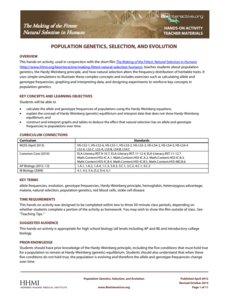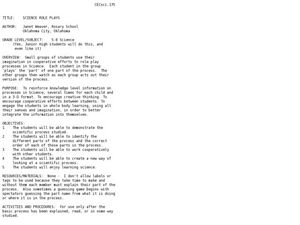Science Matters
Seismic Activity and California Landforms
By the 19th lesson plan in the 20-part series, scholars realize volcanoes and earthquakes are related to plate boundaries. The lesson plan extends and applies the knowledge by having individuals create a bumper sticker for one specific...
National Wildlife Federation
Lights, Camera, Action! Conducting an Energy Audit
Thirty percent of energy used by schools is used inefficiently! Part two in the series of 12 has groups perform energy audits of their schools as part of the Cool Schools Challenge. Each group is assigned a specific room, performs the...
National Wildlife Federation
The Amazing Adventures of Carbon: How Carbon Cycles through the Earth
Here's a stat for your pupils: 18 percent of the human body is carbon! Part 10 in the series of 12 takes pairs on an adventure through the carbon cycle. After a class reading about carbon, pairs read and choose their own adventure...
Howard Hughes Medical Institute
Lesson 4: Gorongosa's Food Webs
Who eats who in the savannas of Africa? Explore trophic levels with part four of an eight-part series of lessons focused around Gorongosa National Park. After young explorers identify animals using trailcam images, they construct a food...
Nuffield Foundation
Dissection of the Ventilation System of a Locust
Jiminy cricket! If you find yourself plagued by fear of dissection, these locust respiratory system dissection directions will walk you through everything you need to know. Teens inspect a living locust to begin with, then jump over to...
National Center for Case Study Teaching in Science
A Case Study Involving Influenza and the Influenza Vaccine
Using a hypothetical discussion between two coworkers broken up into four parts, budding biologists examine the flu shot and some of the typical arguments for and against it. The conversational nature of the reading makes it engaging and...
Novelinks
The Martian Chronicles: Double-Entry Journals
Teach learners to reflect on their reading with a lesson about double-entry journals. As they read Ray Bradbury's The Martian Chronicles, class members note interesting passages from the text on the left side of their...
Science Matters
Basic Needs
Scholars take part in a grand conversation about the basic needs of living things. Working collaboratively, pupils brainstorm and identify similarities to come to the conclusion that the environment meets the needs of all living...
Howard Hughes Medical Institute
Population Genetics, Selection, and Evolution
The Hardy-Weinberg principle states that alleles and genotypes remain constant in the absence of evolutionary influences. Scholars complete a simple hands-on activity applying the Hardy-Weinberg principle to sample data. They observe how...
Curated OER
Dinosaur Tracks and Critical Thinking
Get your young scientists excited about geology through the study of dinosaur tracks! They will use their power of observation to learn how tracks are made and use critical thinking strategies to suggest a scenario in which they were...
NASA
Christa's Lost Lesson: Effervescence
How are chemical reactions affected by gravity? Learners explore the phenomenon of effervescence as part of the Christa's Lost Lessons series. They compare findings in an experiment on effervescence to a video of a similar experiment in...
Baylor College
There's Something in the Air
Clever! In order to compare indoor and outdoor dispersal rates for the movement of gases and particles through air, collaborators will participate in a classroom experiment. Set up a circular grid and set students on lines that are...
Curated OER
Science: The Bicycle as a System
Students explore how the different parts of a bicycle relate to each other and identify the subsystems. They discover how bicycles work and investigate their history. In groups, students research each of the subsystems and present...
Curated OER
Whose Parts Do I Have? (Wings and Things)
Students identify an animal and a body part and then matches a body part to a specific animal. This will assess their ability to sort organisms and objects into groups according to their parts and describe how the groups are formed and...
Curated OER
Science Role Plays
Students use their imagination in cooperative efforts to role play processes in Science. Each student in the group 'plays' the 'part' of one part of the process. The other groups then watch as each group acts out their version of the...
Curated OER
SCIENCE ROLE PLAYS
Students create a play in which each person in the group is a "character" or part of a system. In this creative instructional activity students are assigned a process in which they write a script about with characters.
Curated OER
Beyond The Earth Part I
Students explore the solar system. In this space science lesson plan, students take notes on the solar system provided by their instructors. Students then collaborate to design a computer-generated drawing of the solar system.
Curated OER
Some of Its Parts
Students study a can opener to find the important parts that make it possible to take the lid off a can of food. They then use this information to decide what new or different subsystems could be added to make it better and explain how...
Curated OER
Eukaryotic Animal Cell, Candy Cell Model: Science
Students review the parts of the eukaryotic animal cell and construct a model using various types of candy.
Curated OER
Science Lesson Plans
Students conduct a variety of exploration activities on various science topics. In this science instructional activity outline, students design a cell encapsulation to hold a specific type of medicine. They give examples of physical and...
Curated OER
NASA's Mars Gamble Pays Off Part 2
Tenth graders explore the planet of Mars. In this Earth Science lesson, 10th graders read articles on the make up of Mars. Students complete a worksheet on their reading.
Curated OER
Sixth Grade Reading Quiz
In this reading worksheet, 6th graders answer multiple choice questions about passages they read, word parts, and more. Students complete 9 problems.
Virginia Department of Education
The Modern Model of Atomic Structure
The difference between atomic mass and atomic number can be confusing for some young chemists. Help your class better understand the concepts by allowing them to sketch an atom on paper and then discuss their experience. Upon completion...
Curated OER
Simple Machines III - Pulleys
The principles behind pulleys, levers, and simple machines are the focus of a science instructional activity. In it, learners take part in a whole-class activity. There are two groups of pupils who each must lift objects with fixed...























